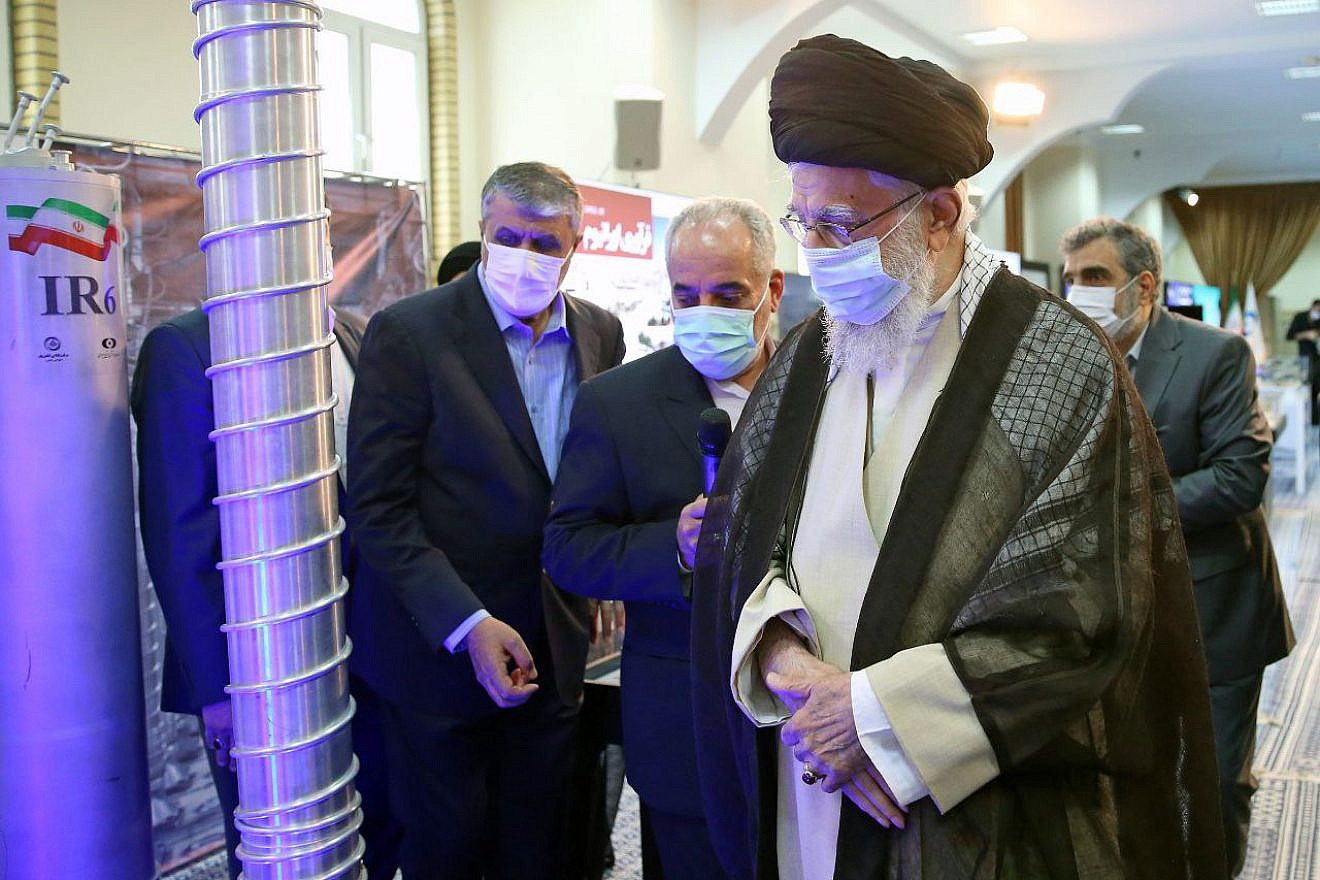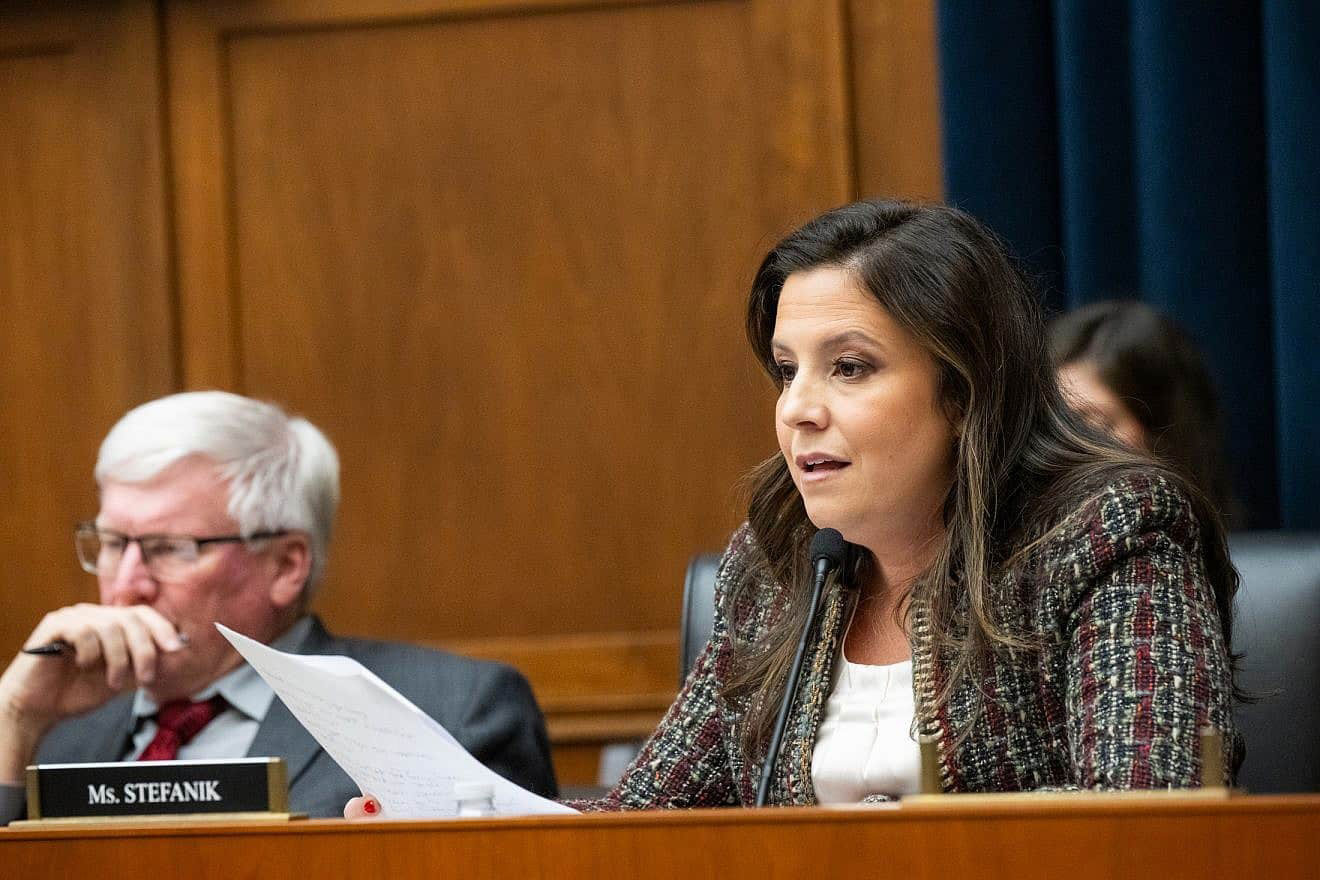Courtesy of JNS. Photo credit: X
Supreme Leader Ayatollah Ali Khamenei tours an exhibition in Tehran on Iran’s nuclear industry, June 11, 2023
(JNS) — The Biden administration privately warned Tehran last month about Iranian research and development activities, Axios reported on Wednesday, citing three Israeli and U.S. officials.
According to the report, Israeli and American officials have both detected suspicious activities by Iranian scientists in recent months.
“Officials fear they could be part of a covert Iranian effort to use the period around the U.S. presidential election to make progress toward nuclear weaponization,” the article states.
The concerns date back to March, when U.S. and Israeli intelligence obtained information that Iranian scientists were involved in computer modeling and metallurgical research that could be used to advance a nuclear weapons program.
“Some U.S. and Israeli officials said the intelligence was a worrying signal about Iran’s nuclear weapons ambitions, but other officials on both sides characterized it as a ‘blip’ that doesn’t represent a shift in Iran’s policy and strategy,” according to Axios.
Biden administration officials conveyed their concerns to the Iranians several weeks ago both through a third country and direct channels, the U.S. officials said. The Iranians responded with explanations for the nuclear activities and stressed that there was no change in policy and that they are not pursuing a nuclear weapon.
The exchanges of messages and other information addressed some of the Israeli and American concerns, according to the Axios report, but significant concerns remains.
“We do not see indications that Iran is currently undertaking the key activities that would be necessary to produce a testable nuclear device,” a U.S. official said.
“We take any nuclear escalation by Iran incredibly seriously. And, as the president has made clear, we are committed to never letting Iran obtain a nuclear weapon — and we are prepared to use all elements of national power to ensure that outcome.”
U.S. National Security Advisor Jake Sullivan and Secretary of State Antony Blinken on Monday hosted Israeli National Security Adviser Tzachi Hanegbi and Strategic Affairs Minister Ron Dermer at the White House for a U.S.-Israel Strategic Consultative Group meeting.
The American and Israeli leaders “were joined by senior representatives from their respective foreign policy, defense and intelligence agencies” for a discussion about countering the Iranian threat to the Jewish state and the region, the White House said.
The group also addressed “developments with respect to Iran’s nuclear program and discussed mutual coordination on a series of measures to ensure that Iran can never acquire a nuclear weapon,” according to the U.S. readout of the meeting.
U.S. and Israeli officials told Axios that the intelligence services of both countries were aligned in their assessment of the Iranian nuclear program, both believing that there has been no order from Iranian Supreme Leader Ali Khamenei to initiate the production of a nuclear weapon.
Meanwhile, the regime in Tehran continued its belligerent public statements against Israel.
Hamas’s Oct. 7 massacre in southern Israel shifted the balance in the Middle East “in favor of the resistance,” interim Iranian foreign minister Ali Bagheri Kani said on Tuesday in his first interview with a U.S. outlet.
The Jewish state “cannot return once again to before the 7th of October,” Bagheri Kani told Newsweek, adding that Jerusalem “should accept this change and shift of balance that has been created today, which is against Israeli Zionists and in favor of the resistance.”
Asked about the prospect of Iran returning to the negotiating table to discuss the renewal of the 2015 nuclear deal, Bagheri Kani underlined Tehran’s conviction that “the ball is in the court of the other side.”
The Iranian diplomat claimed that the Islamist regime has always been “very honest and serious and, of course, we will be honest and serious when it comes to ensuring interaction with all international actors.”
Following meetings with Iranian officials in May, U.N. nuclear watchdog chief Rafael Grossi told reporters that the regime’s cooperation with the International Atomic Energy Agency had been “completely unsatisfactory” in recent months and urged the country to adopt “concrete” measures to address concerns.
There have also been recent Iranian threats of a push towards the bomb. On May 9, an adviser to supreme leader Ali Khamenei said that Iran would weaponize its nuclear program if Israel “threatens its existence.”
Last month, Tehran threatened that an IDF military operation against Hezbollah terrorists in Lebanon could lead to an “obliterating war” with all of Tehran’s proxy groups, warning that “all options are on the table.”





